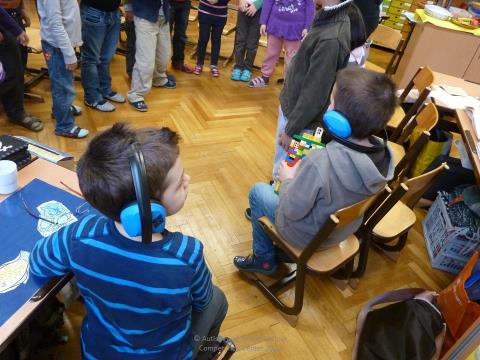A municipal-level pilot-project towards continuous schooling of children with autism
- Solution
- Children with autism pilot-project
- Organization
- Vienna Board of Education
- Country of Implementation
- Austria
- Region
- Europe
- Subregion
- Western Europe
- City
- Vienna
- Start Year
- 2015
- First published
- 31.01.2020

Solution details
“I learned how to behave in a way that others understand me better.” Christopher, a pupil with autism
This pilot-project of the City of Vienna is geared towards all compulsory education facilities in the country state to achieve a continuous and successful school process for children with autism. While the policy focuses on training teachers, there is also a strong emphasis on supporting and counselling parents. Individual solutions are created for each child, in accordance with the Basic Law on Equal Treatment and the Federal Disability Equality Act. Since 2015, the number of children with autism who complete compulsory schooling has increased from 50 per cent to 95 per cent.
Problems Targeted
For a long time, children with autism were excluded from regular school attendance because the schools lacked competence in pedagogical diagnostics and professional handling.
Solution, Innovation and Impact
The policy is an initiative of the Department of Education of the City of Vienna (Bildungsdirektion fuer Wien), implementing the Federal Disability Equality Act. Begun in 2015, children with autism were significantly involved in the project’s design, and they were able to communicate their needs and wishes for a learning environment in which they could develop. The policy uses a holistic approach involving key actors both within institutions of education (e.g., teachers) and outside such institutions (e.g., families, therapeutic professionals). From kindergarten onwards, children are accompanied through all systemic transitions by trained teachers and by mentors who work in and outside class and who assist parents with out-of-school issues, such as therapies. In school, there are special learning materials such as visual aids and cards with written tasks to facilitate communication, and mentors work with regular teachers on the best ways to facilitate the inclusion of children with autism. Around 1,000 teachers in the entire Vienna school system are accompanied and supported by ten mentors. Since the project’s start in 2015, more than 800 children with autism have benefitted.
Funding, Outlook and Transferability
The personnel cost of the mentors is spread over several organizations, including the Department of Education (DoE), Fonds Soziales Wien (a public funding agency and service provider), and the Austrian Autism Aid Organization (an NGO). The DoE is currently working on three objectives for the future: the creation of a legal basis for the implementation of equalization of disadvantaged groups (which is currently not available to children with autism) or a binding decree by the Education Directorate for all types of schools; the further opening of secondary schools; and networking to enable education up to the age of 18.
Media
Pictures
Videos
Downloads
Life Story
THE STORY OF CHRISTOPHER (16), A HIGH-SCHOOL STUDENT WITH AUTISM
“We used pictures so I could better understand the rules.”
The start to Christopher ́s school career was not particularly successful. He felt sad, misunderstood by teachers, and avoided every challenge or game by becoming defensive or running away. After being diagnosed with autism, things started to improve when his teachers got support from the Kompetenzzentrum für SchülerInnen im Autismus-Spektrum, an institution of the City School Council for Vienna. “First, I worked alone with Sabrina, my mentor, since my classroom was much too noisy and chaotic,” recalled Christopher. Later, a daily agenda was developed, which proved particularly successful in getting tasks done and in helping Christopher to follow rules. “Those rules, we always used pictures to discuss them, and I even drew them myself to fully understand them,” the young student explained. Each day other children were invited to learn and play together, so Christopher learned to share, switch roles in games, and how to ask for something in a polite way. Reading, writing, and calculating also entered slowly into the routine. After one year Christopher changed to another class, and in 2019 he moved to a gymnasiale Oberstufe (an Austrian high school), where he will get his degree in four years. He still has a contact person in school, but most of the time he manages his daily routine completely on his own.
Related information
- Connections
- 2
-
Organization
- People